- Home
- J. T. Edson
Goodnight's Dream (A Floating Outfit Western Book 4) Page 3
Goodnight's Dream (A Floating Outfit Western Book 4) Read online
Page 3
‘Action front!’ Lane barked to his waiting men. ‘Eight hundred and eighty yards. Load and commence firing.’
Even while the words were being spoken, the trained crews started to move. Leaping from their horses and tossing the reins to the waiting cavalrymen, they ran to the mules. Swiftly the wheels and carriages were unshipped from the mules that carried them and assembled. Even as nuts were being tightened to secure the pieces, the tube was brought from its carrier and fitted into position. Other men unloaded and opened the ammunition panniers, two from each mule, lifting the lids to expose the eight rounds each held.
‘Three-and-three-quarter-second fuse!’ ordered the sergeant in charge of the ammunition supply, estimating the time it would take for a spherical case shell to reach its destination half a mile away.
Obediently the men from One and Three guns cut into the circular pewter disc of a case shell’s Borman fuse at the appropriate place. Then they carried their charges to the guns. Having no need for such refinements as fuses, the Five gun was first into action. Taking the fixed round from the man who brought it, the loader tore the paper covering from the serge powder bag and slid the charge down the 32.9 inch long tube. Another man used the vent-pick to pierce the powder bag, leaving a clear way for the flame from the friction primer iv to reach the waiting explosive charge. Pushing the primer into place, he connected it to the lanyard and backed clear of the howitzer.
‘Trail left!’ ordered the gunner, having set the tube for the desired angle to hurl the solid shot among the Indians. ‘Right a shade! A touch more! Steady! Fire!’
Within one minute of Lane’s command, the Number Five howitzer boomed out its first shot. Five seconds later, the One and Three guns spoke and their loads rose skywards following the solid shot’s curving arc towards where the Indians had already begun their attack down the slope.
Plunging out of the heavens, the solid shot hurled up a cloud of sand from the west bank of the river. Ignited by the detonating main powder charge, a spurt of flame crept along the Borman fuse of each spherical case shell. At best using case shell, even with the well-designed Borman fuses, was a chancy business, with premature bursts, or no detonation at all occurring regularly. The case from the One howitzer exploded some thirty feet in the air over the Comanches, raining .69 caliber musket balls down on them. While set for the same time, the other case landed ahead of the attacking braves before the flame crawling along the fuse reached and ignited the 4.5 ounce burster charge. However, the crew of the Three gun had no cause for complaint at the result of their shot.
Caught in the blast from the two exploding cases, consternation and pandemonium reigned among the Kweharehnuh. Horses squealed, reared and a couple went down as musket balls struck them. The charge was halted and changed into a milling, plunging mass of men and horses.
Urged on by the gunners, the three howitzer crews made fast time in reloading and altering their aim. Before the amazed Indians could regain control of their startled horses, the next solid shot plunged down among them. Struck by the cannon ball, one of the tehnap’s head’s dissolved into bloody pulp and the man next to him also went down. Then the two spherical case shells arrived. For once both fuses burned perfectly and the cases ruptured to spew forth their musket-ball loads. More men and horses went down under the hail of flying lead.
Brave warriors as the Kweharehnuh might be under normal circumstances, they had never faced cannon-fire and could not understand the nature of the devilish devices which rained down on them. Before the braves could recover, the well-served howitzers belched their third loads into the air. Taken with the sight of Goodnight leading his men at a charge along the river’s bank, the arrival of the ball and two spherical cases proved to be the final straw. Only one of the cases exploded, but a ball from it caught the war-bonnet chief between the eyes and tumbled him from his horse.
Seeing their leader go down was all the rest of the demoralized band needed. Frightened of the unknown they might be, but they still scooped up all their wounded and most of the dead in the mad melee caused by turning to escape.
In the lead of his party, Goodnight saw that the decision to bring the howitzers along had been fully justified. Around three hundred Kweharehnuh had gathered, a force against which the cowhands and cavalrymen would have stood no chance in an open fight. Goodnight had hoped that the guns would produce panic, but knowing the nature of the enemy could not rely on it happening. The gamble had come off and the way was clear to effect Loving’s rescue.
At the sight of their companions disrupted and broken by the artillery bombardment, without being aware of what caused it, the warriors at the mouth of the cave turned and ran. Not all of them escaped, for the cowhands and soldiers cut loose with their revolvers on coming into shooting range. The rout, however, was as complete as it could be. Watching the fleeing Kweharehnuh, Goodnight doubted if they would stop for miles and they certainly had no intention of returning to resume the fight.
Charging his roan through the water, Goodnight galloped it to the mouth of the cave. He left the saddle with the horse still running, hurdled the bodies before the entrance and plunged inside with a Colt in his right hand. Cold anxiety bit into the rancher at what he saw. Loving sprawled against the rear wall, blood oozing from the bullet-hole in his chest and welling up around the arrow that protruded from his body.
The rescue had come just too late to prevent the trail-blazing cattleman from being seriously wounded.
Chapter Three
Those Texas Trail-Hands Are All Rebels
‘How’d it go, John?’ Goodnight asked his segundo, wanting to take his mind off what was happening in the cave.
‘No trouble, Colonel,’ Poe answered. ‘Fact being, we handled the herd as easy, if not easier, than with the full crew.’
Although Goodnight would remember the words at a later date, at that moment he gave them little attention. Rowdy Lincoln, the trail drive’s cook, appeared at the entrance to the cave and approached the rancher. Big, burly, wearing flour-dappled range clothes, the cook’s normally jovial features held an expression of worry and concern as he halted before his employer and nodded in the direction from which he had come.
‘I’ve got the bullet and arrow out, Colonel Charlie,’ Lincoln said, his voice easy and gentle as it was except on rare occasions. ‘But he’s still in a mighty poor shape.’
‘Can we move him?’ Goodnight inquired.
‘His chances aren’t good whether we take him with us, or let him rest up here. Maybe the post surgeon at Fort Sumner can do something when we get there—if Oliver lasts that long.’
It was late afternoon on the day of the rescue and Rowdy Lincoln had just finished performing his secondary, but equally important, function as part of the trail crew. Over the years, through force of necessity, the cook had gained much experience in the treatment of injuries received far from any qualified medical attention. So he had been fetched from the herd by one of Goodnight’s cowhands and went to work at treating Loving’s wounds on his arrival.
From the rim above the men came the sounds of the herd passing and John Poe had come down to learn how Loving fared. From all appearances, the cattleman was in a very bad way and it would tax Lincoln’s considerable skill to keep him alive. However, Poe did not allow himself to fall into despondency. He admired and respected Loving second only to Goodnight but knew that life must go on.
‘I’ll get back to the herd, boss,’ Poe said quietly.
‘Sure, John,’ Goodnight confirmed. ‘Look for a way down farther along. Water them, push across and find a bed-ground.’
‘Yo! The blue-bellies didn’t hang around long, did they?’
‘Major Lane’s under orders to reach Sumner as soon as possible. Anyways, he left us an escort.’
After a scouting party had been sent out and returned to say that the Comanches had left the area, Lane had made his preparations to continue the journey to Fort Sumner. He had, however, left half of his cavalry escort under a se
rgeant to travel with the herd and help fight off further Indian attacks. Maybe the soldiers left behind had fought against the South in the War, but they were professionals and forgot their differences. More so having tasted Rowdy’s cooking and knowing the duty would produce fresh meat and other good food instead of hardtack or biscuits.
Returning to the herd, Poe guided it along the rim, found an easy place to descend and completed his employer’s orders. With the cattle bedded down on the western bank of the Pecos, the bed-wagon was fitted out to carry the wounded Loving the remainder of the journey.
During the days that followed, Goodnight had many misgivings over his partner’s welfare. While the bed-wagon had been made as comfortable as possible, it was not designed for the transportation of a seriously wounded man. Yet Loving’s chances would have been no greater if he had been left under a heavy guard at the cave. The cattleman’s condition did not improve or seem to grow worse. Most of the time he lay in a condition of semi-coma, never complaining, always trying to act cheerfully and aware that his only slender hope was in reaching the post hospital at Fort Sumner.
Four days’ drive—around forty miles—out of the Fort, Goodnight found that Major Lane had not forgotten Loving. An Army surgeon arrived with a Rocker Ambulance and small cavalry escort. Examining the wounded cattleman, the surgeon confirmed Rowdy’s views, praised the cook’s handling of the injuries and stated that only his skill had kept Loving alive. However, the cattleman’s condition was critical and the surgeon wanted to deliver him to Fort Sumner as quickly as possible. The Rocker ambulance had been designed for the rapid transportation of wounded passengers over rough, road-less country and was the best vehicle of its kind so far. v So Goodnight raised no objections to the transfer.
With Loving carried off in the Rocker ambulance, the trail drive continued. It went by smoothly, with no further incidents to mar its progress and the crew began to look forward to the pleasures awaiting them when they received their pay. For Goodnight, thoughts of his partner’s condition lessened the pleasure he felt at having almost completed the drive and being one step closer to turning his dream into a practical reality.
The arrival of the herd created a stir of interest at the Fort and among the citizens of the small town that had grown up outside the walls of the Army post. Views on the matter in the latter area differed. Some considered that the Government should not waste money feeding ‘them stinking red varmints’. Others, having a greater experience of matters Apache felt only relief that the Army would be able to keep its promises by supplying meat to the reservations.
However, interested as they were in the herd’s arrival, the two men standing slightly away from the crowd of loafers outside the Yellow Stripe saloon subscribed to neither of the popular views. Their clothing showed that they did not belong to the area. Although travel-stained, their city suits were costly and well tailored. The heavy gold watch chains across their vests and other signs pointed at wealth beyond that of the general run of the onlookers and their sun-reddened features hinted they had recently come from some cooler climate to the heat-baked Territory of New Mexico. One was tall, bluff of appearance, with side-whiskers and a mouth that smiled frequently even though his eyes did not. More sober in selection of clothing and some six inches shorter than his companion, the other had a clean-shaven, sharp face with a thin, tight mouth.
‘He made it, Joe,’ the bigger man remarked unnecessarily as they watched the herd being brought to a halt on the open ground to the west of the Fort.
‘Yes, damn him. He made it,’ agreed the other. ‘Which doesn’t mean that he’ll get that Army beef contract.’
‘No. But they’ll be more willing to consider him now he’s brought in a herd.’
‘Maybe we should give them other things to consider about him coming here, Stu,’ the smaller of the dudes remarked. ‘Like reminding them how those Texas trail hands are all rebels. There’ll be folks in this town who won’t take kind to that.’
With the herd brought to a halt, Goodnight looked to where the Army’s cattle-buying commission was coming from the Fort. Led by Colonel Hunter, a tall, plump member of the Quartermaster Corps, the two majors and half-a-dozen enlisted men studied the cattle. Before he did anything else, Goodnight inquired as to his partner’s condition and learned there was no change. Then the men got down to business. The price offered and accepted was one which Goodnight felt to be most satisfactory and of the greatest use to his future plans.
‘We’ll have to grade and examine the herd, of course,’ Hunter said, sounding almost apologetic and offering Goodnight a cigar from the number he carried in his jacket pocket. ‘It’s not that I doubt your honesty, but you understand my position.’
‘I do,’ Goodnight assured him. ‘How about the weights?’
‘Between us, we ought to reach a fair figure,’ the officer replied. ‘Shall we make a start, Mr. Goodnight?’
‘Tell us what you want doing and we’ll get it done,’ Goodnight answered.
‘Can your men bring them up one at a time so that we can check their weight, condition and number?’ Hunter requested. ‘It has to be done.’
‘That figures,’ Goodnight replied and gave his orders.
Low groans greeted the news of Goodnight’s intentions. Most of the cowhands had expected to hand the cattle straight over to the soldiers and be left free to sample whatever delights or pleasures the town had to offer. Instead they found themselves sent to cut out every individual steer and lead it up for inspection by the buying commission. It promised to be a long, tedious, boring and possibly dangerous business. At best the steers in the herd were only half-domesticated and feared human beings only when seeing them on horseback.
First the captured steers were led by where John Poe, one of the majors and two corporals waited to count them. While the major’s military assistants each held a tally-book and pencil, the segundo kept his count with no greater aid than tying a knot in a length of cord for every hundredth steer to go by.
From being counted, each steer was taken to the second major. A qualified veterinary surgeon, he had to check the animal’s condition; no easy matter despite the controlling rope about its neck. Fortunately few of the herd required a close inspection, being in excellent condition.
Which brought the steer to the third and, from the Army’s and Goodnight’s points of view, most important part of the examination.
For all his excellently cut uniform under a knee-long white linen-duster jacket, air of pompous dignity and an almost political desire to keep everybody contented, Hunter rapidly proved himself a better than fair judge of cattle. He certainly knew sufficient to avoid falling into a basic error often made where Texas longhorn cattle were concerned.
Seeing a longhorn from the side for the first time, an inexperienced person might easily form a greatly exaggerated estimation of its poundage. Tall, leggy, flat-ribbed, a longhorn’s profile produced an illusion of extra bulk and heft. Viewed from the rear, the cat hams, narrow hips and swayed, ridge-pole kind of backbone with a thin, high shoulder top dispelled such notions of excessive weight. As shown by the way the body tucked up in the flanks, or legs had length rather than bulky thickness, the longhorn’s free-ranging way of life prevented it from being a quick converter of forage into beef and producing clean, heavy cuts of meat down to the hock. Any fat gathered in times of good grazing was disposed evenly about the body, instead of being stored in the belly or on the legs. Coarse of head and hair, carrying a great spread of needle-pointed horns, the Texas longhorn could run, jump, fight and live off the land in a manner which no carefully raised Eastern beef-breed might hope to equal.
Clearly Hunter knew of the Longhorn’s physical conformation. If his estimation of a given steer’s weight tended to go under rather than over, it always came close enough to satisfy Goodnight. Between them, they were forming a fairly accurate total of the herd’s poundage on the hoof. While the price would have been at least double for dressed, butchered beef, the subsequen
t wastage of bone and hide had to be taken into consideration.
The work continued, although not always smoothly. Roped and hauled from the security of the herd, the earlier steers displayed a marked reluctance to the separation. When checked and driven well clear of the main body, they needed constant watching to prevent them fleeing back to it.
As might be expected, an audience soon formed. Loafers and other town-folk mingled with off-duty soldiers and hovered in the background to see what was going on. Among them were the two dudes who had commented so cryptically from the sidewalk outside the Yellow Stripe Saloon about Goodnight’s arrival. Standing slightly aside from the crowd, they watched everything that happened with more than just idle or casual interest.
‘If that’s all the weighing they get—’ the bigger man began.
‘It’s got possibilities,’ agreed his companion.
At first the crowd saw nothing out of the ordinary, other than fine but normal riding and roping. Wanting to get finished and into town, the Texans worked fast and the sizes of the two bunches began to grow more even. Suddenly a big steer broke from the Army herd in a determined attempt to return and find its travelling companion with the unchecked cattle. Cut off by a fast-riding, tall, young cowhand the steer reversed its direction and headed towards the onlookers.
‘Stop it!’ roared the veterinarian, a man of hasty temper and conscious of his superiority over the less-well-educated cowhands.
Already the young Texan had twirled his mount around and given chase. Holding the checked cattle had not called for the use of his rope, so it hung coiled on his saddle horn. There would be no time to free it, work open a loop and rope the fleeing red steer before it plunged in among the crowd. However, he knew how to handle the situation. That there was an appreciative audience, including several pretty girls, did nothing to lessen his intention of doing so.

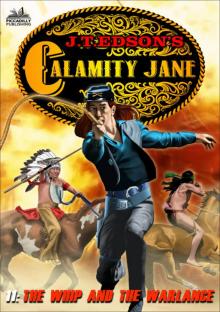 Calamity Jane 11
Calamity Jane 11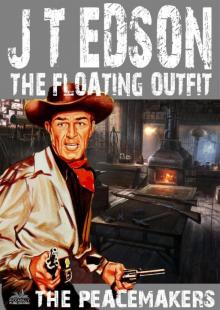 The Floating Outift 33
The Floating Outift 33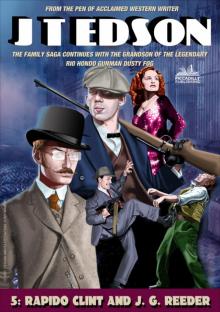 Cap Fog 5
Cap Fog 5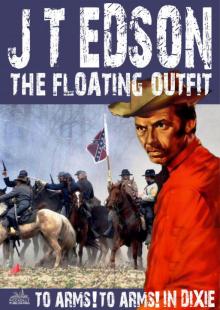 The Floating Outfit 34
The Floating Outfit 34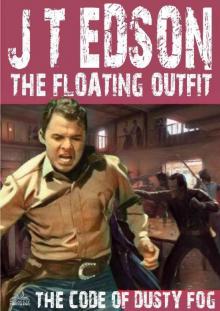 The Code of Dusty Fog
The Code of Dusty Fog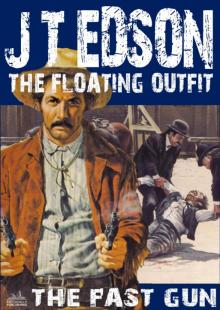 The Floating Outfit 21
The Floating Outfit 21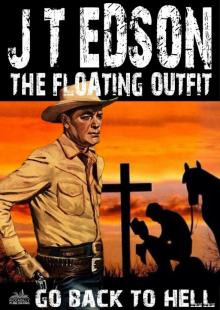 The Floating Outift 36
The Floating Outift 36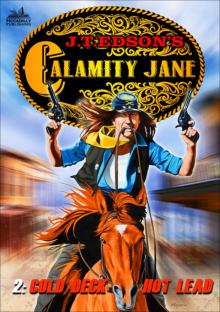 Calamity Jane 2
Calamity Jane 2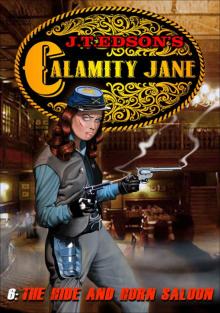 Calamity Jane 6: The Hide and Horn Saloon (A Calamity Jane Western)
Calamity Jane 6: The Hide and Horn Saloon (A Calamity Jane Western)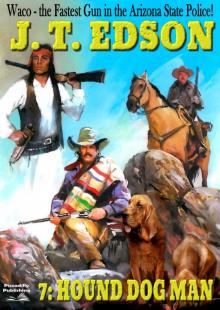 Waco 7
Waco 7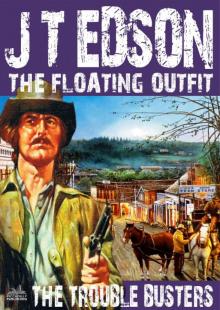 The Floating Outfit 25
The Floating Outfit 25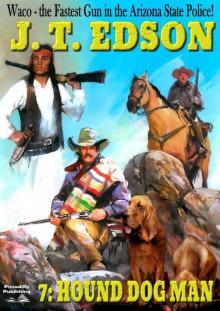 Waco 7: Hound Dog Man (A Waco Western)
Waco 7: Hound Dog Man (A Waco Western)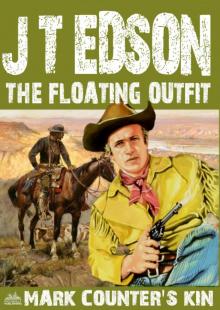 The Floating Outfit 47
The Floating Outfit 47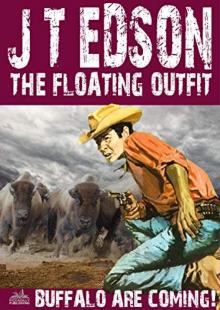 The Floating Outfit 42: Buffalo Are Coming!
The Floating Outfit 42: Buffalo Are Coming!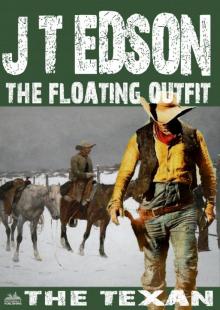 The Floating Outfit 46
The Floating Outfit 46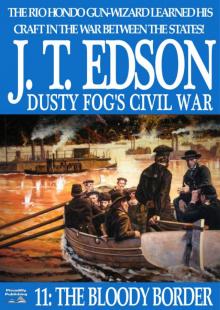 Dusty Fog's Civil War 11
Dusty Fog's Civil War 11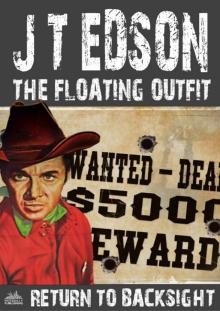 The Floating Outfit 61
The Floating Outfit 61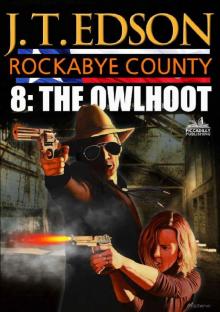 The Owlhoot
The Owlhoot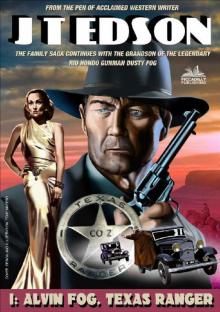 Alvin Fog, Texas Ranger
Alvin Fog, Texas Ranger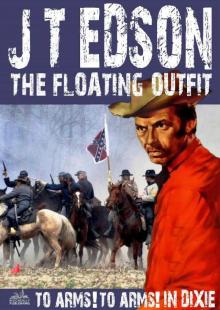 The Floating Outfit 34: To Arms! To Arms! In Dixie! (A Floating Outfit Western)
The Floating Outfit 34: To Arms! To Arms! In Dixie! (A Floating Outfit Western)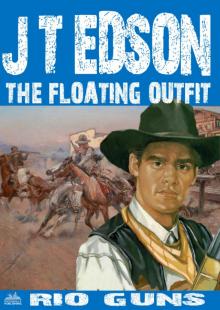 The Floating Outfit 44
The Floating Outfit 44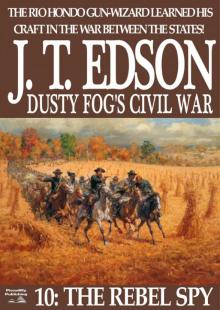 Dusty Fog's Civil War 10
Dusty Fog's Civil War 10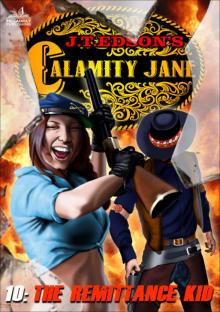 Calamity Jane 10
Calamity Jane 10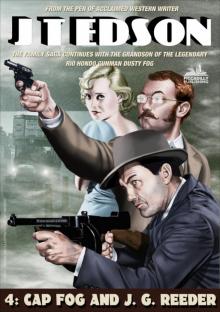 Cap Fog 4
Cap Fog 4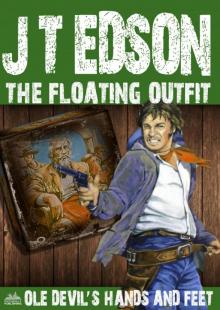 The Floating Outfit 51
The Floating Outfit 51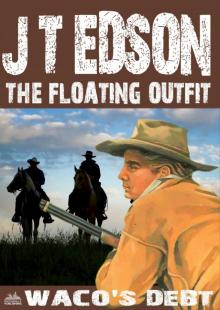 The Floating Outfit 50
The Floating Outfit 50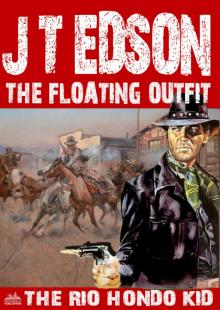 The Floating Outfit 49
The Floating Outfit 49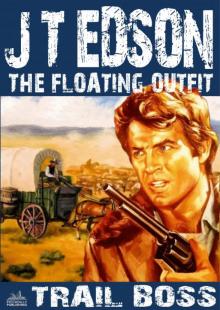 The Floating Outfit 10
The Floating Outfit 10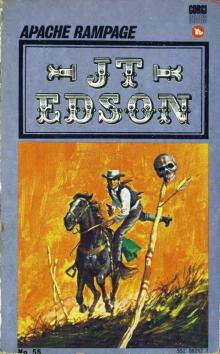 Apache Rampage
Apache Rampage The Floating Outfit 15
The Floating Outfit 15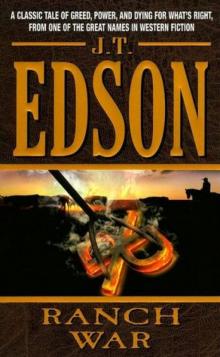 Ranch War
Ranch War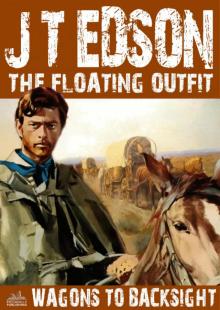 The Floating Outfit 11
The Floating Outfit 11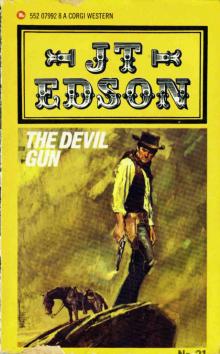 The Devil Gun
The Devil Gun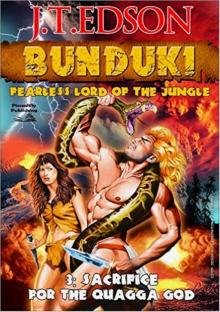 Sacrifice for the Quagga God (A Bunduki Jungle Adventure Book 3)
Sacrifice for the Quagga God (A Bunduki Jungle Adventure Book 3)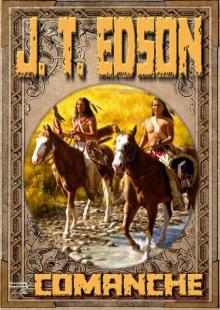 Comanche (A J.T. Edson Western Book 1)
Comanche (A J.T. Edson Western Book 1)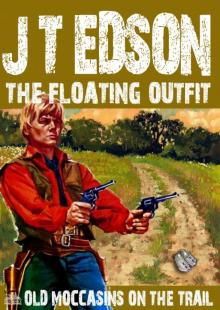 The Floating Outfit 48
The Floating Outfit 48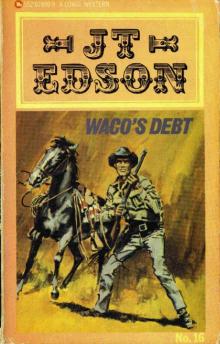 Wacos Debt
Wacos Debt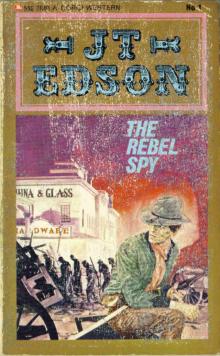 The Rebel Spy
The Rebel Spy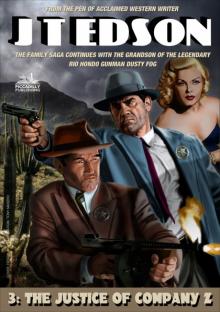 Cap Fog 3
Cap Fog 3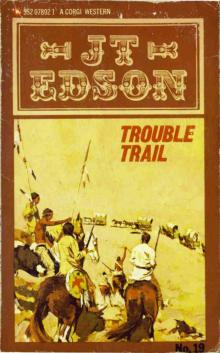 Trouble Trail
Trouble Trail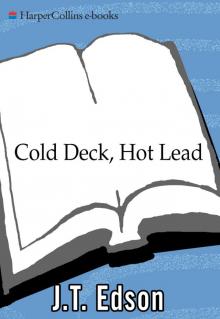 Cold Deck, Hot Lead
Cold Deck, Hot Lead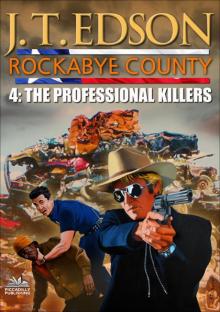 Rockabye County 4
Rockabye County 4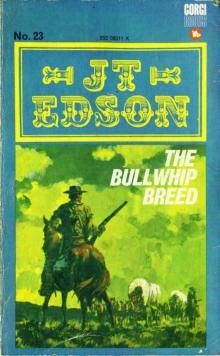 The Bullwhip Breed
The Bullwhip Breed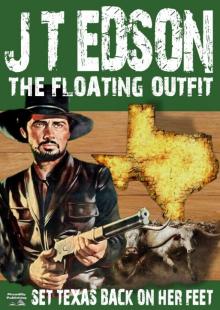 Set Texas Back On Her Feet (A Floating Outfit Western Book 6)
Set Texas Back On Her Feet (A Floating Outfit Western Book 6)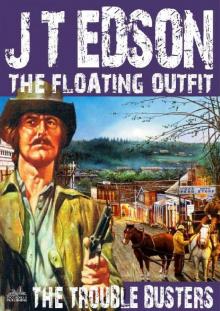 The Floating Outfit 25: The Trouble Busters (A Floating Outfit Western)
The Floating Outfit 25: The Trouble Busters (A Floating Outfit Western)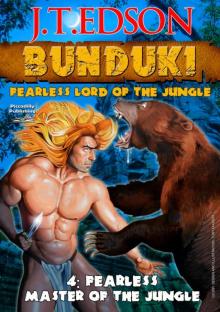 Fearless Master of the Jungle (A Bunduki Jungle Adventure
Fearless Master of the Jungle (A Bunduki Jungle Adventure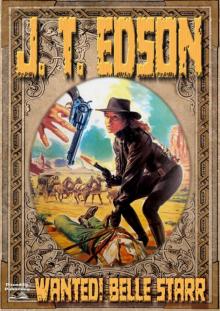 Wanted! Belle Starr!
Wanted! Belle Starr!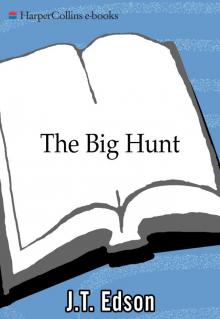 The Big Hunt
The Big Hunt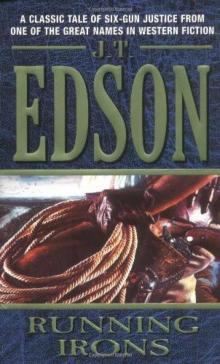 Running Irons
Running Irons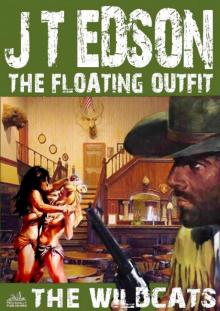 The Floating Outfit 19
The Floating Outfit 19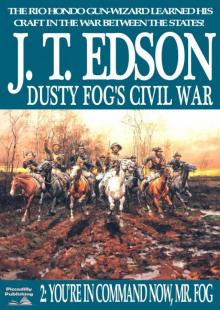 You're in Command Now, Mr Fog
You're in Command Now, Mr Fog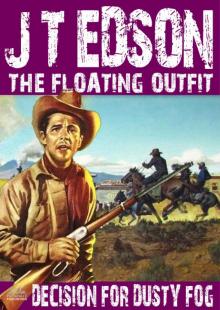 The Floating Outfit 27
The Floating Outfit 27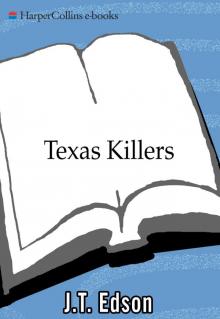 Texas Killers
Texas Killers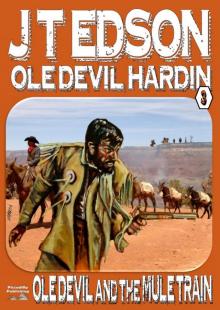 Ole Devil and the Mule Train (An Ole Devil Western Book 3)
Ole Devil and the Mule Train (An Ole Devil Western Book 3)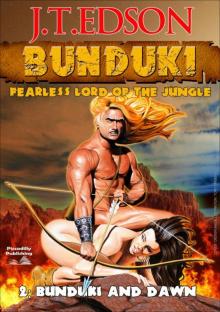 Bunduki and Dawn (A Bunduki Jungle Adventure Book 2)
Bunduki and Dawn (A Bunduki Jungle Adventure Book 2)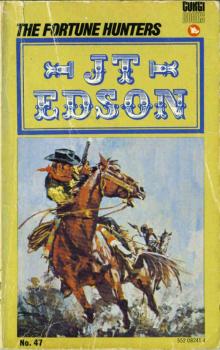 The Fortune Hunters
The Fortune Hunters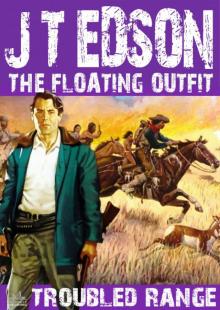 The Floating Outfit 12
The Floating Outfit 12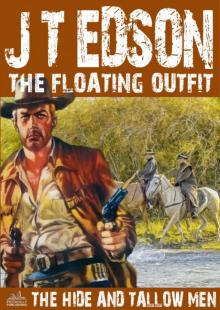 The Hide and Tallow Men (A Floating Outfit Western. Book 7)
The Hide and Tallow Men (A Floating Outfit Western. Book 7)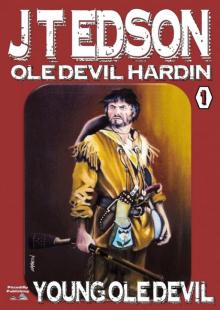 Young Ole Devil
Young Ole Devil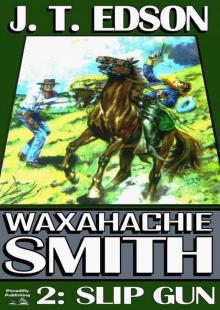 Slip Gun
Slip Gun The Drifter
The Drifter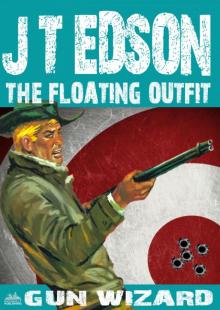 The Floating Outfit 45
The Floating Outfit 45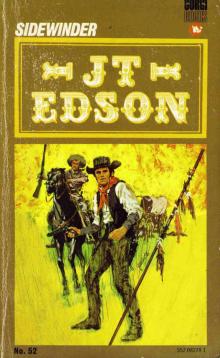 Sidewinder
Sidewinder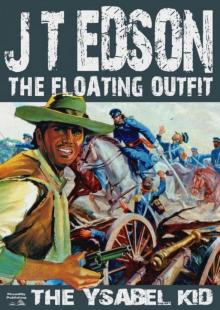 The Ysabel Kid
The Ysabel Kid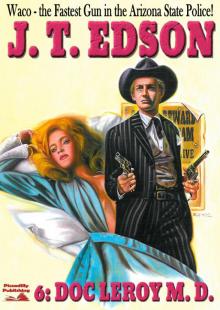 Waco 6
Waco 6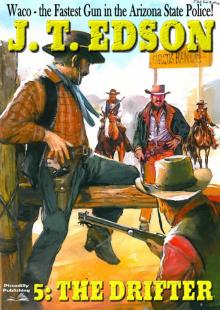 Waco 5
Waco 5 Point of Contact
Point of Contact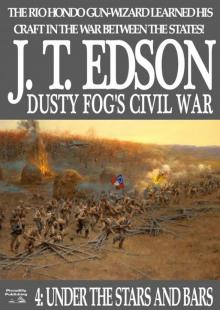 Under the Stars and Bars (A Dusty Fog Civil War Western Book 4)
Under the Stars and Bars (A Dusty Fog Civil War Western Book 4)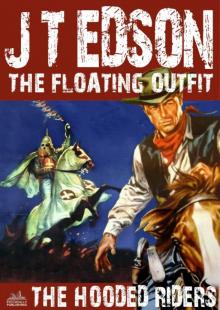 The Floating Outfit 9
The Floating Outfit 9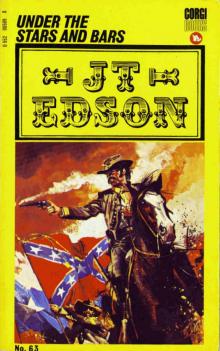 Under the Stars and Bars
Under the Stars and Bars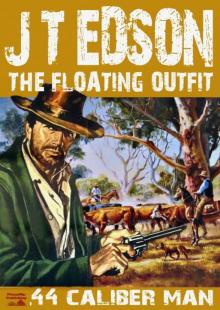 .44 Caliber Man
.44 Caliber Man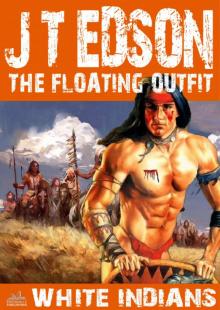 The Floating Outfit 17
The Floating Outfit 17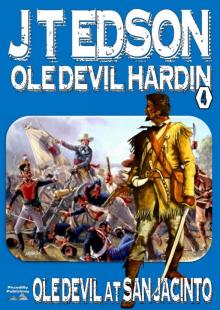 Ole Devil at San Jacinto (Old Devil Hardin Western Book 4)
Ole Devil at San Jacinto (Old Devil Hardin Western Book 4)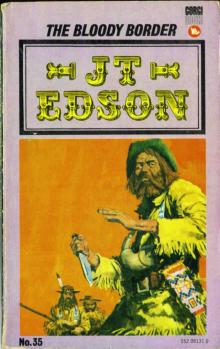 The Bloody Border
The Bloody Border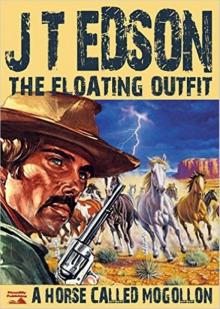 A Horse Called Mogollon (Floating Outfit Book 3)
A Horse Called Mogollon (Floating Outfit Book 3)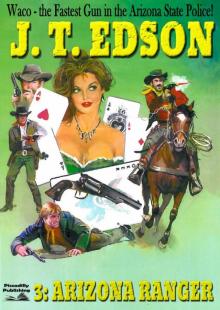 Waco 3
Waco 3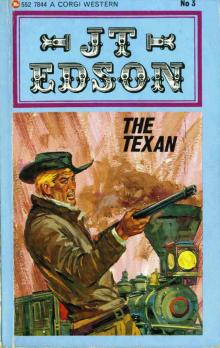 The Texan
The Texan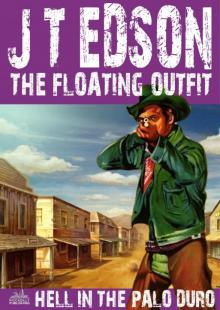 The Floating Outfit 35
The Floating Outfit 35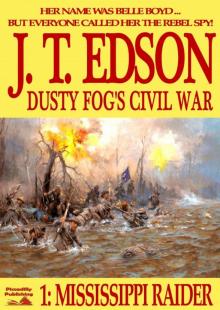 Mississippi Raider
Mississippi Raider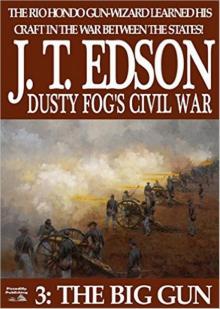 The Big Gun (Dusty Fog's Civil War Book 3)
The Big Gun (Dusty Fog's Civil War Book 3)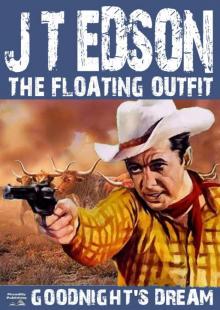 Goodnight's Dream (A Floating Outfit Western Book 4)
Goodnight's Dream (A Floating Outfit Western Book 4) Waco 4
Waco 4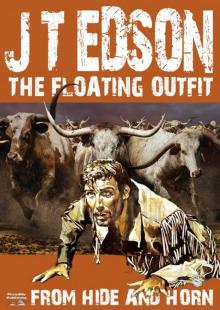 From Hide and Horn (A Floating Outfit Book Number 5)
From Hide and Horn (A Floating Outfit Book Number 5)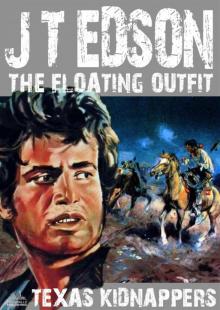 The Floating Outfit 18
The Floating Outfit 18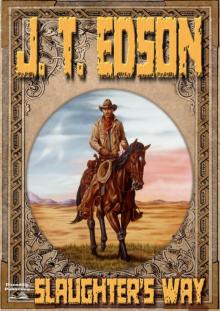 Slaughter's Way (A J.T. Edson Western)
Slaughter's Way (A J.T. Edson Western)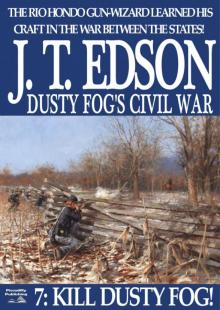 Dusty Fog's Civil War 7
Dusty Fog's Civil War 7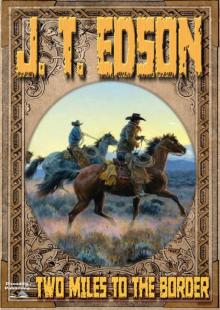 Two Miles to the Border (A J.T. Edson Western)
Two Miles to the Border (A J.T. Edson Western)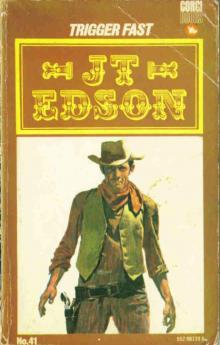 Trigger Fast
Trigger Fast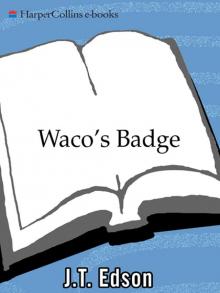 Waco's Badge
Waco's Badge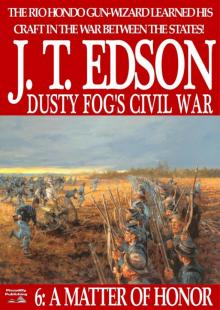 A Matter of Honor (Dusty Fog Civil War Book 6)
A Matter of Honor (Dusty Fog Civil War Book 6)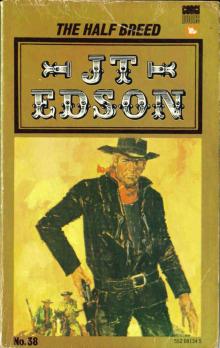 The Half Breed
The Half Breed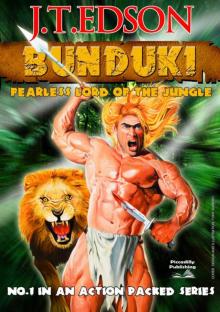 Bunduki (Bunduki Series Book One)
Bunduki (Bunduki Series Book One)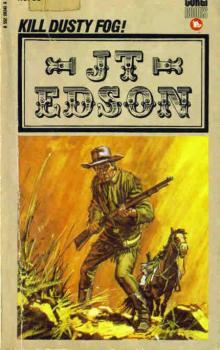 Kill Dusty Fog
Kill Dusty Fog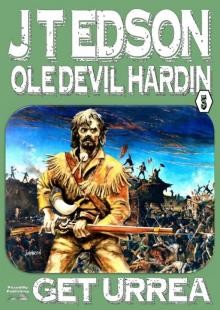 Get Urrea! (An Ole Devil Hardin Western Book 5)
Get Urrea! (An Ole Devil Hardin Western Book 5)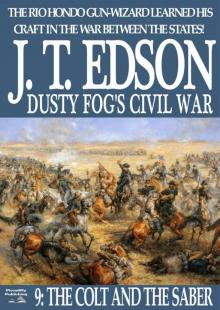 Dusty Fog's Civil War 9
Dusty Fog's Civil War 9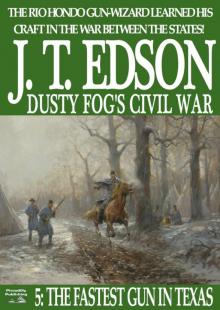 The Fastest Gun in Texas (A Dusty Fog Civil War Book 5)
The Fastest Gun in Texas (A Dusty Fog Civil War Book 5)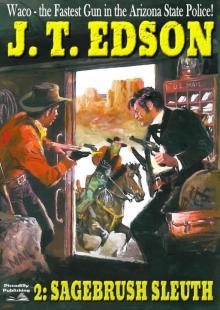 Sagebrush Sleuth (A Waco Western #2)
Sagebrush Sleuth (A Waco Western #2)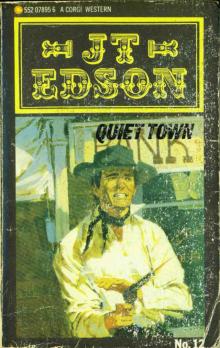 Quiet Town
Quiet Town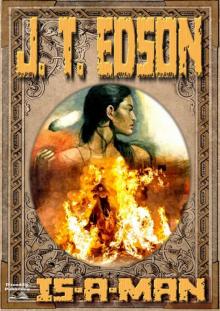 Is-A-Man (A J.T. Edson Standalone Western)
Is-A-Man (A J.T. Edson Standalone Western)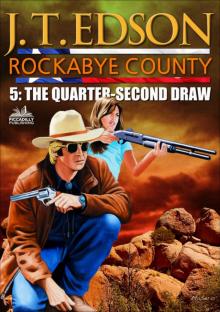 Rockabye County 5
Rockabye County 5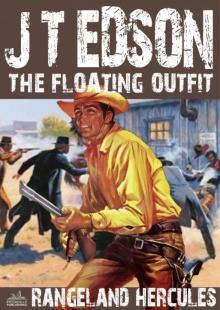 The Floating Outfit 14
The Floating Outfit 14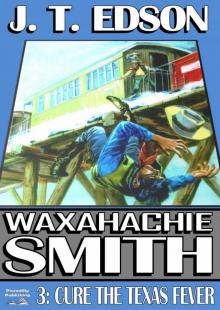 Cure the Texas Fever (A Waxahachie Smith Western--Book 3)
Cure the Texas Fever (A Waxahachie Smith Western--Book 3)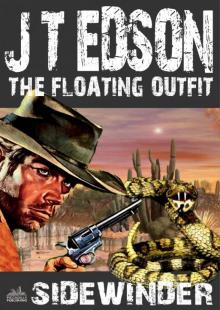 The Floating Outfit 13
The Floating Outfit 13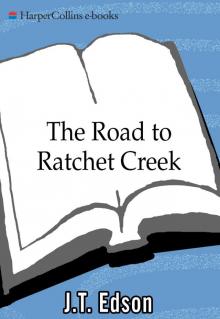 The Road to Ratchet Creek
The Road to Ratchet Creek